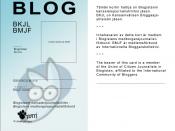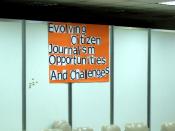'Traditional mainstream journalism has passed its use by date. The rise of blogs and citizen journalism will change the role of journalism. The question is: what will this role be?'
In the past decade, the upsurge of popularity in new media technology, such as the Internet, blogging and participatory publishing, has had an immense impact on the medium of traditional mainstream journalism. Now, more than ever, the profession of journalism is undergoing, what some critics would call "an identity crisis" (Anderson and Ward, 2001, p. 17), and while it has not passed its use by date, journalism needs to start reflecting and rethinking about its new roles and practices among the new media or risk becoming obsolete. This paper aims to discuss the previous roles that journalism played in society, how these roles are changed by the popularity of the new media and how the profession of journalism is evolving in the age of new media technology.
Finally, it aims to provide insight into what journalism today should acknowledge and take into consideration if it wishes to continue to thrive.
Many have tried to define what is journalism, who is a journalist, and the role he or she plays or should play in society. Tapsell and Varely (2001) have quoted Windschuttle in defining a journalist as a person who travels into the "external real world ⦠find out what's going on ⦠do empirical investigation ⦠then try and report that as truthfully and objectively as you can" (p. 5). As suggested by King (1997), a journalist's job is to look for the truth, engage and connect with the audience, operate independently and question society, uphold society's principles, convey the message transparently and always aim to be impartial in what he or she reports. A study in 1992 has...



its great work
its great work
0 out of 0 people found this comment useful.